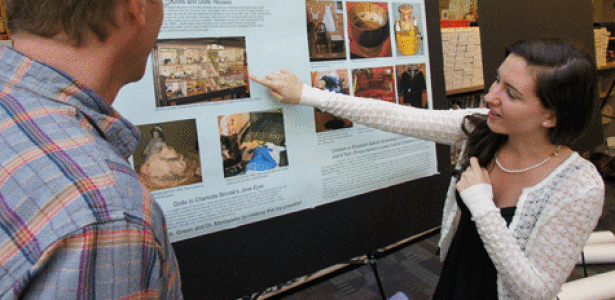Hiring in the English department: the teacher selection process
The UNC Wilmington Department of English offers students a variety of opportunities outside the classroom, including the bi-annual English in Action showcase. Students also have the unique opportunity to give feedback on prospective future professors in the classroom.
The Department of English at UNC Wilmington offers some of the most enriching programs for their students. English in Action is a bi-annual showcase that celebrates students’ work at the end of the semester. Wentworth Travel Fellowships help fund student travel to locations related to their favorite authors or literary characters. There are also various special interest courses like Buenos Aires: Capital of Culture, a two-week, two-credit spring semester course led by faculty professors Paula Kamenish and Shirley Mathews.
While student opportunities abound outside the classroom, students in this department also have the unique chance to weigh in on the future of the department by meeting faculty candidates before they are hired.
Many students often reference RateMyProfessor.com—an interactive website that allows students to evaluate their university professors—prior to signing up for classes, but students rarely consider the hiring process that their instructors must undergo prior to being selected for professorship.
In UNCW’s Department of English, the hiring committee consists of the department chair and an interview team, which includes the hiring committee chair. When finalists for a specific position are chosen, each candidate is invited on a series of campus visits. These visits include a presentation and interview with the department, a reception and a teaching demonstration. Teaching demonstrations provide each candidate the opportunity to lecture a class within their field.
Donald Bushman, English department chair, describes this portion of the hiring procedure as an opportunity for students to be involved in the hiring process.
“[Candidates] are coming from all over the country. The candidates teach a class in their specialty area. I think it makes sense to have students included in the process,” Bushman said.
Jeremy Tirrell, assistant professor and writing coordinator of the English department, explains that the main way undergraduate students provide feedback about faculty candidates is that all candidates must teach a sample class.
“Ordinarily those same students will see all of the candidates for that position—there’s usually three—and they’ll provide feedback about that candidate that way,” Tirrell said.
While student input is not a deciding factor in the final selection of a candidate, that is to say they do not have an official vote on the hiring committee, some students believe that the hiring committee should include the students’ voices in the voting process.
“I think it’s a good process, but I think the people deciding on the candidate should listen more to the student feedback,” said senior English major LeTriece Calhoun.
Calhoun recalled an English class she took during the fall of 2012 when a candidate chosen by the committee received lower class ratings than the other two candidates.
“We clearly liked one candidate more and thought [that candidate] communicated the points of the lesson well while making the subject interesting,” Calhoun said. “Instead, they chose the candidate we liked the least because [the candidate’s] teaching method was uninteresting and…[the candidate] didn’t articulate the points of the lesson clearly.”
While students and faculty approval of a candidate may differ in experiences, the input of permanent faculty lecturers is welcomed. These faculty lecturers are allowed to participate in the interview process as well as the reception for the candidates. Graduate students also provide a more involved role than undergraduates.
“Graduate students…will interact with job candidates usually by taking them to a meal, a lunch or giving them a campus tour. [They] press more personal interaction with the candidates and provide feedback to the faculty based on those experiences,” Tirrell said.
Although undergraduates do not have a direct voting role in the hiring process, allowing students to partake in the selection process of a future faculty member provides another opportunity for enriching these students’ participation in the affairs of their department.
To learn more about the Department of English’s hiring process, visit their homepage.









